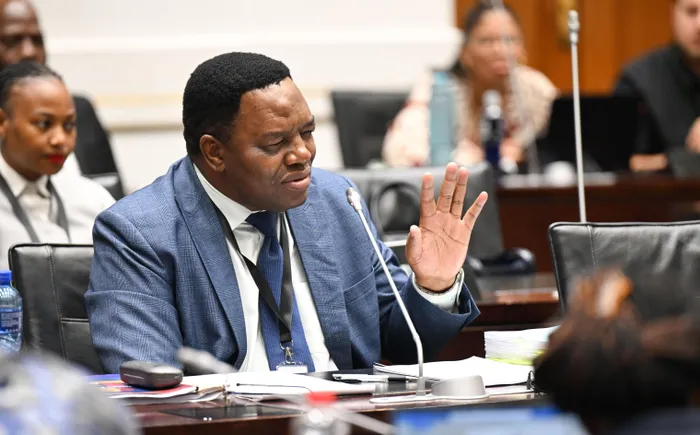'The whole system is compromised': Mkhwanazi's shocking allegations demand parliamentary investigation

KZN police commissioner Nhlanhla Mkhwanazi has stunned Parliament with sweeping corruption allegations against the judiciary, IPID, IDAC, and media organizations, claiming the entire criminal justice system is compromised and dysfunctional. His testimony included calls to investigate classified information leaks and collusion between state bodies.
Image: Henk Kruger/Independent Media
KwaZulu-Natal's police commissioner, Lieutenant-General Nhlanhla Mkhwanazi, has ignited a firestorm of controversy this week as he made several high-profile requests to Parliament.
During a two-day testimony at a parliamentary inquiry, Mkhwanazi urged for investigations into critical matters concerning the integrity of the Crime Intelligence unit and alleged misconduct within the judiciary.
In a dramatic series of allegations made during the inquiry, Mkhwanazi accused various state bodies, including the Independent Directorate Against Corruption (IDAC) and the Independent Police Investigative Directorate (IPID), among others.
He specifically charged that the judiciary appears to be complicit in major criminal activities, expressing frustration over a magistrate’s ruling that barred Crime Intelligence head Dumisani Khumalo from entering intelligence offices, saying it did not make sense.
“I believe in this case that bail condition that was imposed was not coincidental,” he said.
His remarks drew sharp criticism from Economic Freedom Fighters (EFF) leader Julius Malema, who argued that Mkhwanazi's use of a magistrate’s ruling as evidence against the judiciary was overreaching.
In response, Mkhwanazi hinted at further alarming details he could share in a private session.
“You will hear things that might shock you,” he said.
Dan Mafora, a senior researcher at the Council for Advancement of the South African Constitution, said Mkhwanazi has to be specific on the corrupt activities by members of the judiciary.
“But it's unhelpful for him to speak in broad terms in a way that does not help identify who these people are and where they are so that the allegations can be addressed,” Mafora said.
One of the more contentious elements of Mkhwanazi's testimony was his request for the State Security Agency to investigate the role of the media, following his claims of leaked classified information.
This came against the backdrop of his concerns about stories published by newspapers from leaked classified information and MPs raising public matters that should be dealt with in the designated parliamentary committee.
It was also reported recently the Inspector-General of Intelligence recommended criminal charges against some in the top brass of police over R120 million spent on purchasing crime intelligence properties.
Major media organisations and freedom of expression advocates responded harshly, raising alarms about the implications for journalistic freedom.
Political analyst, Professor Andre Duvenhage said there was no basis to investigate journalists who have the right to investigate everything they can.
“The media in a democracy should be free and they should be operating freely, but they also have a responsibility. If there was a problem, it was politicians communicating to the journalists, and that is probably irregular.”
Duvenhage also said the systems could be dysfunctional and actors were becoming frustrated with the internal dynamics of the situation and were using journalists to get a message out.
“But, I think it is wrong to penalise the messenger. I am prepared to argue that if it was not for the independent communication structures and media, and if it was not for investigative journalism, we wouldn't have seen anything with regard to State Capture and many other irregularities,” he said.
Mkhwanazi also called for investigations into the IDAC following the arrest of several Crime Intelligence officers, including its chief, Khumalo, amidst allegations of irregular appointments.
The committee, he said, should look at the number of cases that were moved from IPID to IDAC after IDAC’s Matthew Sesoko moved from IPID to IDAC.
He further questioned apparent collusion involving forensic investigator Paul O’Sullivan and the interactions of the IPID under former head Robert McBride.
Mkhwanazi told MPs that he was told by Police Minister Senzo Mchunu’s chief of staff Cedrick Nkabinde that the operations of IPID were planned, coordinated and executed at O’Sullivan’s house.
Mkhwanazi said the investigation should extend to gadgets the City of Johannesburg and the Directorate of Priority Crime Investigation bought when police deputy commissioner Shadrack Sibiya was in their employment.
Moreover, Mkhwanazi raised concerns about National Coloured Congress leader and MP Fadiel Adams, highlighting his claims of finding classified information at his office as merit for investigation.
“The control register in that office for people to come in and out will prove, will give evidence of people that have been visiting the office, including the honorable member, Mister Adams.”
Duvenhage said it was for the first time a senior police officer was saying the whole system was compromised.
“The fact of the matter is, if they are compromised, as is the case, at least in terms of the evidence we have at the moment, it is clear that the system is completely dysfunctional.”
Commenting on Mkhwanazi’s calls to investigate IPID and IDAC, Duvenhage said there there should be an investigation no doubt.
“There should be investigations about IPID and all these institutions. That is the type of oversight institutions that must secure constitutional and democratic values.”
“And clearly, they didn't do their job so also, Parliament didn't do its job in terms of their oversight function,” he said.
mayibongwe.maqhina@inl.co.za
Related Topics: